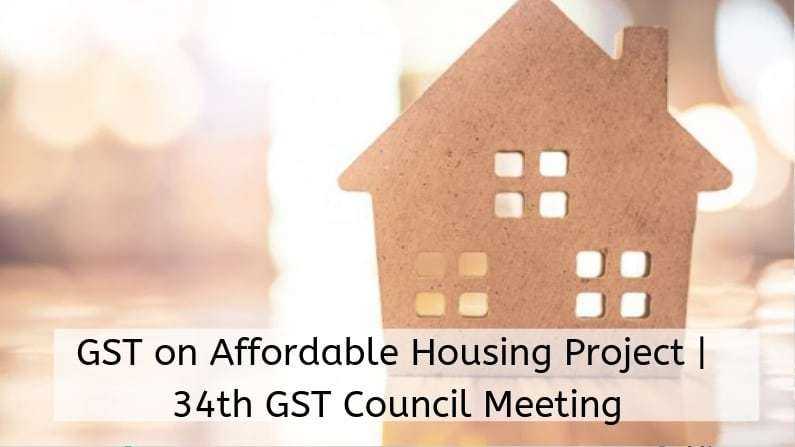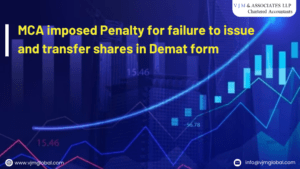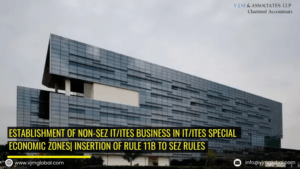33rd Goods and Services Tax (“GST”) council meeting suggested reduction in GST rates on housing projects to achieve vision of “Housing for All by 2022”.
33rd GST Council meeting held on 24th February 2019 discussed GST on housing projects. GST Council reduced GST rates on affordable housing projects and other housing projects from 8% and 12 % (with Input Tax Credit “ITC”) to 1% and 5% (without Input Tax Credit (“ITC”)) respectively.
New GST rates will come into effect from 1st April, 2019.
In continuation thereof, the 34th GST council meeting held on 19th March, 2019 (presided by Hon’ble Finance Minister Arun jaitley ) discussed about operational details for implementation of the recommendations made on the real estate sector.
The recommendation made on the real estate sector in 34th GST Council meeting
1. Comparison of GST Rates on housing Project
Before understanding the modalities suggested in the 34th GST council meeting , refer below table for GST rates on housing projects.
| Type of Project | GST Rate (Old) | GST Rate (New) | Effective Date |
| Affordable housing project | 8% (With ITC) | 1% (Without ITC) | 1st April, 2019 |
| Other Housing projects | 12% (With ITC) | 5% (Without ITC) | 1st April, 2019 |
Affordable house means any residential house upto carpet area of 90 sqm in non-metropolitian city/town and 60 sqm in metropolitan cities value upto INR 45 lacs (both metropolitan and non-metropolitan cities).
Metropolitan Cities are Bengaluru, Chennai, Delhi NCR (limited to Delhi, Noida, Greater Noida, Ghaziabad, Gurgaon, Faridabad), Hyderabad, Kolkata and Mumbai (whole of MMR)
GST Council in the 34th GST Council meeting decided the modalities as follows:
2. Treatment of Ongoing Projects
One of the major hindrances inapplicability of revised tax rates is tax treatment on on-going projects. GST council at 34th GST Council meeting decided the implication as follows:
2.1 Applicable GST Rates
- Promoter shall be given one-time option to decide rate of tax payment on on-going projects. He may opt to pay tax as per old regime, i.e., 8% on affordable housing projects or 12% on other housing projects (with ITC) or as per new regime, i.e., 1% on affordable housing projects or 5% on other housing projects (without ITC).
- On-going project means where construction and actual booking both have commenced prior to 1st April, 2019.
- Option once exercised can’t be changed for a project.
- Accordingly, if promoter opts to pay tax as per old regime, he will pay tax as per old rates and will be entitled to claim input tax credit for such ongoing project.
2.2 Treatment of accumulated ITC, if promoter opts for new tax rate regime
- Under new tax regime, promoter will be liable to pay GST at lower rate without any ITC. Accordingly, he will be required to reverse ITC accumulated as on 31st March, 2019 on pro-rata basis.
- For mixed projects (consisting both commercial and residential portion), ITC to be reversed shall be computed on pro-rata basis in proportion to carpet area of commercial portion in on-going project to the total carpet area of project. Tax on commercial portion will be discharged as earlier.
2.3 Manner of computation of ITC to be reversed
- ITC for entire project will be computed based on ITC claimed and percentage of project completed.
- Eligible ITC will be computed based on percentage of Booking of flats and percentage of invoicing done.
- Example: XYZ construction company has an ongoing residential project which is 60% completed which consist of 50 flats. Out of 50 flats, company has received booking for 35 flats and for such booked flat billing has done to the extent of 45% till 31st March, 2019. During the entire project, company has claimed ITC to the tune of INR 12 Lacs. Now as on 31st March, 2019, eligible credit will be computed as follows:
- ITC for entire project on pro-rata basis: INR 20 lacs (12 Lacs pertains to 60% of completed project)
- Eligible ITC booked flats and invoicing done: INR 6.3 Lacs (20 lacs pertains to 50 flats, whereas billing is done upto 45% for 35 flats)
- ITC required to be reversed: INR 5.7 Lacs (12 Lacs – 6.3 Lacs)
3. Treatment of New Projects
3.1 Applicable GST Rates
- Affordable housing project will be subject to GST @ 1% without any ITC.
- All houses other than affordable housing project will be subject to GST @ 5% without any ITC.
- Where commercial apartments are situated in residential real estate projects (RREP) and carpet area of commercial apartment is not more than 15% of total carpet area, such project will be considered as other than affordable housing project and accordingly, will be subject to GST @ 5% without any ITC.
3.2 Condition for claiming reduced rate of GST
- No input tax credit will be available.
- 80% of input and input services (other than capital goods, TDR/JDA, FSI, long term lease) shall be purchased from registered persons. If promoter fails to make 80% of purchase from registered person then he is required to pay GST under reverse charge mechanism (“RCM”) on shortfall at the rate of 18 per cent. However, if cement is purchased from unregistered dealer, then, GST should be discharged at the rate of 28 per cent under RCM and also on capital goods at applicable rates.
4. Treatment of TDS/FSI and Long term lease for projects commencing after 01st April 2019
4.1 Taxability of TDR (“Transfer of Development Rights)/FSI (“Floor Space Index”) & Long Term Lease (Premium) under GST
- Supply of TDS/FSI and long term lease premium of land by a landowner to builder shall be exempted from payment of GST provided that constructed flats are sold before issuance of completion certificate and tax is paid on them.
- However, if flats are sold after issuance of completion certificate, then supply of TDS/FSI & long term lease will be subject to GST @ 1% for affordable housing project and @ 5% for other housing project.
- GST on TDR/FSI & long term lease is payable under RCM by builders on the date of issuance of completion certificate.
Note: ITC rules will be amended to provide more clarity on manner of computation of monthly and final ITC to be availed and reversed in real estate projects. In case of mixed project, amended rules shall also provide procedure of availing ITC on commercial portion as commercial portion will continue to tax as earlier.
Read the complete Press release here
Read more onGST Amendment Act, 2018 & Its Impact: 20 Major Changes






